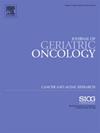The effect of lifestyle interventions on sarcopenia in advanced colorectal cancer: A systematic review
IF 3
3区 医学
Q3 GERIATRICS & GERONTOLOGY
引用次数: 0
Abstract
Introduction
Sarcopenia is a common syndrome in older patients with advanced colorectal cancer that is worsened during standard-of-care chemotherapy and is associated with increased chemotherapy toxicity, impaired quality of life, and poorer survival independent of cancer stage or chemotherapy response. Physical activity and nutrition interventions have been shown to support muscle mass in patients recovering from treatment for early-stage colorectal cancer. The aim of this present review was to evaluate the effect of physical activity and nutritional interventions on sarcopenia in patients with advanced colorectal cancer.
Materials and Methods
We performed a systematic literature review of studies investigating the impact of physical activity and nutritional interventions on muscle mass in patients with advanced colorectal cancer. Relevant key words were searched in appropriate databases through December 2022. Review procedures were performed in line with guidelines from the Cochrane Handbook for systematic reviews and Synthesis Without Meta-analysis (SWiM) guidelines.
Results
Twelve studies were identified with 1461 participants of which 587 had advanced colorectal cancer. Eight studies were randomised controlled trials (RCTs). Only two studies exclusively reported on the population with advanced colorectal cancer. Physical activity and nutritional interventions explored were heterogenous. Studies reporting an improvement in muscle mass utilised protein supplementation (one study), moderate intensity aerobic exercise (one study), and assisted resistance training (two studies). However, only a small number of participants with advanced colorectal cancer were included in these studies. Risk of bias was moderate to high for most studies. Recruitment to physical activity interventions was often low although adherence to supervised interventions was high. Physical activity and nutritional interventions across studies were safe.
Discussion
A small number of studies with limited sample size and moderate-to-high risk of bias suggest that assisted resistance training and supported protein intake improve muscle mass in participants with cancer. However, there is currently sparse evidence for the effect of physical activity and nutritional interventions on sarcopenia in the setting of advanced and incurable colorectal cancer. Given the impact of sarcopenia in this population, further research in this area is warranted.
生活方式干预对晚期结直肠癌患者肌少症的影响:系统综述。
简介:肌肉疏松症是老年晚期结直肠癌患者常见的一种综合征,在标准化疗期间会加重病情,并与化疗毒性增加、生活质量下降和生存率降低有关,与癌症分期或化疗反应无关。有研究表明,体育锻炼和营养干预可帮助早期结直肠癌患者从治疗中恢复肌肉质量。本综述旨在评估体育锻炼和营养干预对晚期结直肠癌患者肌少症的影响:我们对调查体育锻炼和营养干预对晚期结直肠癌患者肌肉质量影响的研究进行了系统性文献综述。截至 2022 年 12 月,我们在适当的数据库中搜索了相关关键词。根据《科克伦系统综述手册》和《无荟萃分析综述》(SWiM)指南的指导原则执行了综述程序:共确定了 12 项研究,共有 1461 名参与者,其中 587 人患有晚期结直肠癌。其中 8 项研究为随机对照试验 (RCT)。只有两项研究专门报告了晚期结直肠癌患者的情况。所探讨的体育锻炼和营养干预措施各不相同。报告肌肉质量得到改善的研究包括蛋白质补充(一项研究)、中等强度的有氧运动(一项研究)和辅助阻力训练(两项研究)。不过,这些研究只纳入了少数患有晚期结直肠癌的参与者。大多数研究的偏倚风险为中度至高度。体育锻炼干预的招募率通常较低,但坚持监督干预的比例较高。各项研究中的体育锻炼和营养干预都是安全的:讨论:少数样本量有限、偏倚风险中度至高度的研究表明,辅助阻力训练和蛋白质摄入可提高癌症患者的肌肉质量。然而,对于晚期和无法治愈的结直肠癌患者,体育锻炼和营养干预对肌肉疏松症的影响目前还缺乏证据。鉴于肌肉疏松症对这一人群的影响,有必要在这一领域开展进一步的研究。
本文章由计算机程序翻译,如有差异,请以英文原文为准。
求助全文
约1分钟内获得全文
求助全文
来源期刊

Journal of geriatric oncology
ONCOLOGY-GERIATRICS & GERONTOLOGY
CiteScore
5.30
自引率
10.00%
发文量
379
审稿时长
80 days
期刊介绍:
The Journal of Geriatric Oncology is an international, multidisciplinary journal which is focused on advancing research in the treatment and survivorship issues of older adults with cancer, as well as literature relevant to education and policy development in geriatric oncology.
The journal welcomes the submission of manuscripts in the following categories:
• Original research articles
• Review articles
• Clinical trials
• Education and training articles
• Short communications
• Perspectives
• Meeting reports
• Letters to the Editor.
 求助内容:
求助内容: 应助结果提醒方式:
应助结果提醒方式:


